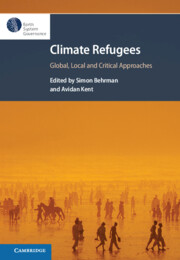Book contents
- Climate Refugees
- Series page
- Climate Refugees
- Copyright page
- Contents
- Contributors
- Acknowledgements
- 1 An Alternative Introduction: An Interview with the Editors, Which Never Took Place
- Part I Global Governance
- Part II International Law
- Part III Regional and Local Perspectives and Solutions
- Part IV Critical Approaches
- 16 Environmental Justice and Climate-Induced Migration
- 17 Coping with Climate Change: A Critical Review of the Link between the Human Rights System and Climate Displacement
- 18 The IOM as a ‘UN-Related’ Organisation, and the Potential Consequences for People Displaced by Climate Change
- 19 Climate Refugees: Is Litigation an Effective Strategy?
- Index
19 - Climate Refugees: Is Litigation an Effective Strategy?
from Part IV - Critical Approaches
Published online by Cambridge University Press: 01 April 2022
- Climate Refugees
- Series page
- Climate Refugees
- Copyright page
- Contents
- Contributors
- Acknowledgements
- 1 An Alternative Introduction: An Interview with the Editors, Which Never Took Place
- Part I Global Governance
- Part II International Law
- Part III Regional and Local Perspectives and Solutions
- Part IV Critical Approaches
- 16 Environmental Justice and Climate-Induced Migration
- 17 Coping with Climate Change: A Critical Review of the Link between the Human Rights System and Climate Displacement
- 18 The IOM as a ‘UN-Related’ Organisation, and the Potential Consequences for People Displaced by Climate Change
- 19 Climate Refugees: Is Litigation an Effective Strategy?
- Index
Summary
Lack of progress in climate change negotiations, accompanied with an overall sense of despair, has led civil society organisations to attempt different strategies in order to mobilise public opinion and push states towards more ambitious climate action. One notably strategy has been the use of national and international courts, with the hope that these will fill in the regulatory gap and force states into action. Many of these claims are relevant for climate refugees, whether explicitly (e.g. by addressing displacement) or indirectly (e.g. by addressing related questions such causality). While this trend is very much still ongoing, enough decisions have been made to allow for an interim assessment of this strategy. This chapter claims that while the appeal to courts have led to some progress, one must consider also the pitfalls inherent in this strategy.
- Type
- Chapter
- Information
- Climate RefugeesGlobal, Local and Critical Approaches, pp. 357 - 372Publisher: Cambridge University PressPrint publication year: 2022

